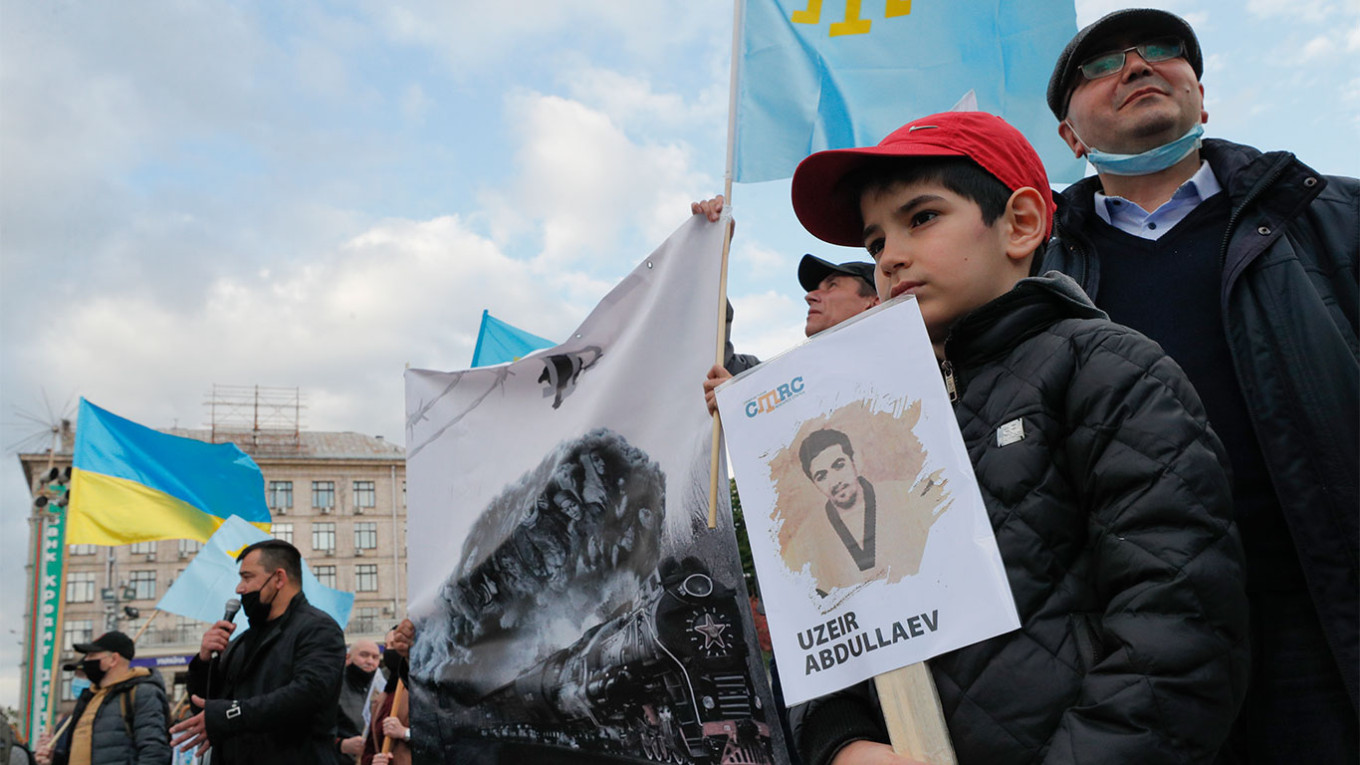While the ongoing war in Ukraine has understandably led many commentators to view the conflict in terms of the wider ideological battles of our times, in so doing it's important not to lose sight of the smaller issues at stake, such as the fate of the Crimean Tatars.
Despite the small size of the Turkic Muslim group that has called the Crimean Peninsula home for centuries, the 350,000-strong Crimean Tatars enjoyed statehood as a khanate between the 15th and 18th centuries before being swallowed up by the Russian empire under Catherine the Great.
An attempt to regain independence in the early 20th century failed, and Stalin later deported the Crimean Tatars to Central Asia, having falsely accused them of collaboration with the Nazis during World War II. Most were only able to return to their homeland after the Soviet Union collapsed in 1991.
Yet the Crimean Tatars to this day aspire to live autonomously within a democratic Ukraine, even if the Russian occupation of their homeland for the past eight years put that dream on hold. However, a string of successful recent Ukrainian military advances has revived the Crimean Tatars' cautious hopes of self-determination.
When the Kremlin seized the largely Russian-speaking Crimean Peninsula in 2014, the Tatar population took to the streets to protest, and while Russian President Vladimir Putin ignored the dissent at the time, the local authorities later targeted the ethnic group, shutting down their independent media outlets, liquidating their NGOs, and persecuting their activists.
In retrospect, it's now clear that the annexation of Crimea was planned to lay the groundwork for a future offensive against the rest of Ukraine, with the occupied peninsula serving as a giant Russian military base complete with long-range missiles and thousands of soldiers.
Since annexation, Crimean Tatars have been dubbed "Islamists" by local media, and dozens of activists have been convicted on outlandish charges of "terrorism." Those who remained at liberty were silenced through intimidation, with tens of thousands choosing to emigrate, mostly to mainland Ukraine.
At least 100 Crimean political prisoners remain behind bars today, the best known of whom is the deputy head of the Mejlis – the Crimean Tatar's informal parliament – who was sentenced to 17 years in jail for "sabotage."
When the Kremlin launched its invasion of Ukraine in February, many Tatars voluntarily joined the ranks of the Ukrainian army to defend their country. But Putin's announcement of partial mobilization in September triggered a very real exodus of the community from Crimea, with over 10,000 Crimean Tatar families choosing to leave for Kazakhstan, Uzbekistan, and Europe rather than having to fight their compatriots.
The sudden decision to leave – often with no preparation – meant that many Crimea Tartars ran into problems upon arrival elsewhere and soon found they were running short of cash. Many found themselves in limbo for weeks with no idea where they were ultimately headed.
Others were unable to leave Crimea at all, either because they ran out of money or because they lacked the required documents. The exact number of Crimean Tatars mobilized by Putin is unknown, but some have already reached the front.
The status of Crimean Tatars serving in the Russian military and captured by Ukrainian forces, especially those too young to have Ukrainian passports, is an increasingly thorny problem and it remains unclear whether Kyiv views them as Russian or Ukrainian citizens.
In other cases, many Crimean Tatars drafted into the Russian army are simply on the lookout for an opportunity to surrender to Ukrainian forces as soon as possible, but that's not always straight forward in a conflict dominated by artillery fired from dozens of kilometers away.
As a result, dozens, perhaps hundreds, of Crimean Tatars will die due to decisions made in the Kremlin, just as they did in 1918 when the Bolsheviks liquidated the Crimean People's Republic, just as they did in 1938 when the NKVD executed dozens of prominent cultural and scientific figures on Stalin's say so, and just as they did in 1944, when almost half those deported died of starvation, disease or exhaustion.
Russia has not allowed human rights NGOs to enter Crimea since 2014, making it near impossible for them to gather material for their reports. Russian human rights organization Memorial has reported on the persecution of the Crimean Tatars in the past and has recognized many jailed activists as political prisoners, but the organization was banned during Russia's slide into totalitarianism and so there will be no more reports.
The Crimean Tatars' spiritual leader, the erstwhile Soviet dissident Mustafa Dzhemilev, often compares contemporary Russia to the U.S.S.R. in his speeches, noting how appalling it is that today's Russia often comes out of such analogies worse than the Soviet Union.
Democracy activists in the 1970s and 1980s were also jailed, but they weren't kidnapped, nor did they disappear without a trace, as Mejlis member Ervin Ibragimov did in 2015. Of course, Soviet repression also extended to the intelligentsia, but some untouchables – such as Andrei Sakharov – remained. In Putin's Russia, the only true untouchable today is the president himself.
A Message from The Moscow Times:
Dear readers,
We are facing unprecedented challenges. Russia's Prosecutor General's Office has designated The Moscow Times as an "undesirable" organization, criminalizing our work and putting our staff at risk of prosecution. This follows our earlier unjust labeling as a "foreign agent."
These actions are direct attempts to silence independent journalism in Russia. The authorities claim our work "discredits the decisions of the Russian leadership." We see things differently: we strive to provide accurate, unbiased reporting on Russia.
We, the journalists of The Moscow Times, refuse to be silenced. But to continue our work, we need your help.
Your support, no matter how small, makes a world of difference. If you can, please support us monthly starting from just $2. It's quick to set up, and every contribution makes a significant impact.
By supporting The Moscow Times, you're defending open, independent journalism in the face of repression. Thank you for standing with us.
Remind me later.








